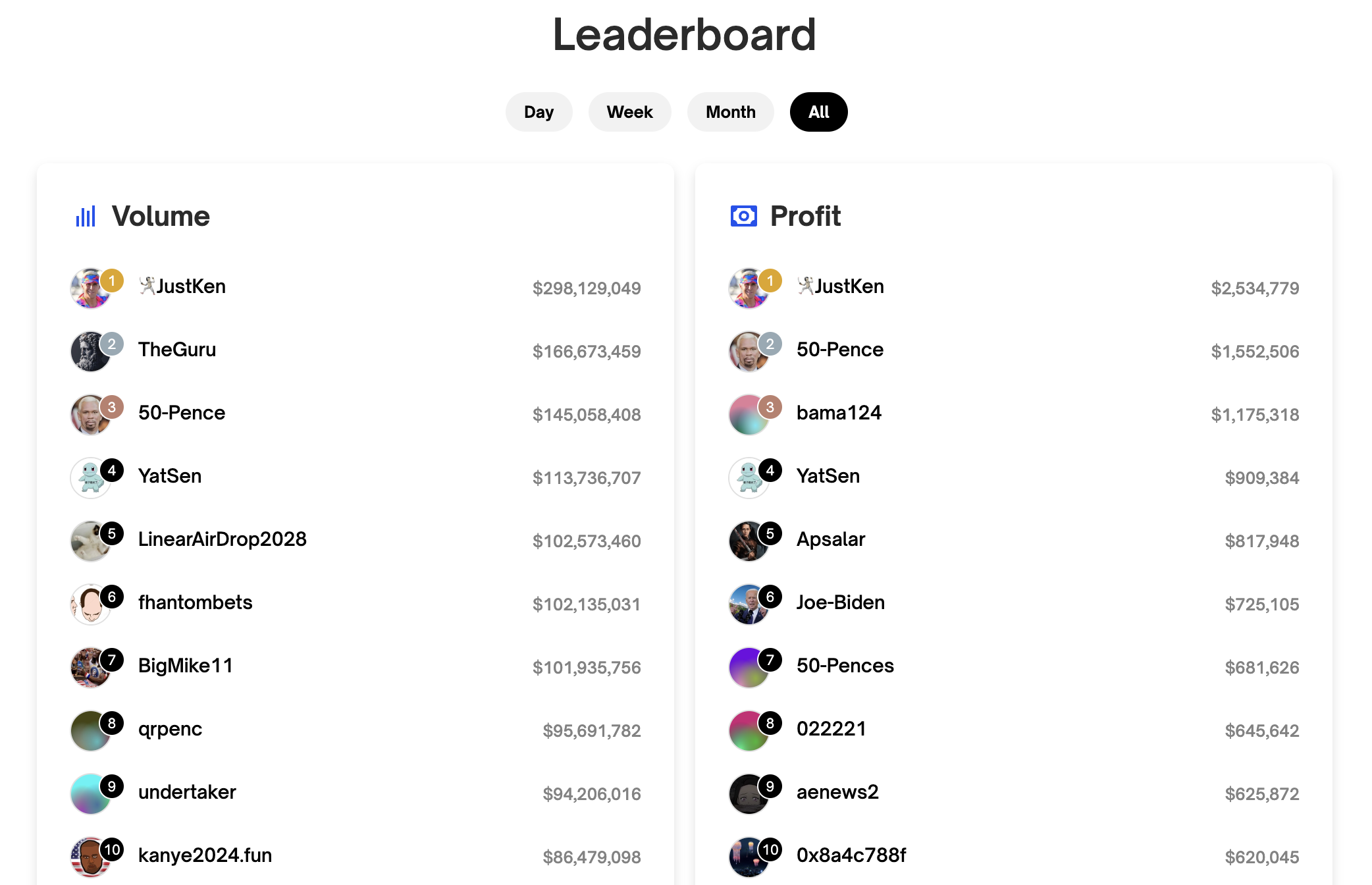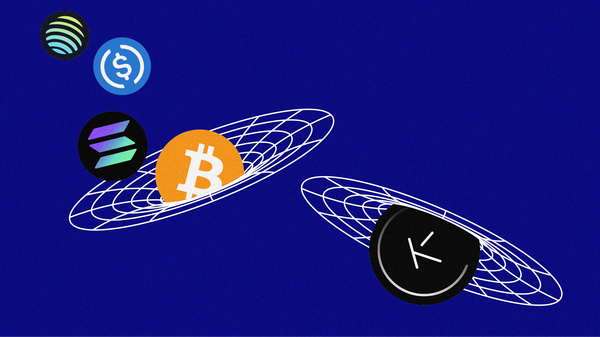A Chat With Domer, the #1 Trader on Polymarket

Introduction
Polymarket has emerged as one of the standout success stories in crypto this year, attracting tens of thousands of daily users and generating hundreds of millions in monthly trading volume. As the largest blockchain-powered betting market, it offers clear advantages over centralized alternatives, proving that crypto unlocks genuine innovation.
Last week, the On Chain Times team had the pleasure of speaking with Domer, also known as 'JustKen' from the Polymarket leaderboard. Domer is the #1 all time trader on Polymarket both in terms of trading volume and profit. With more than 5000 markets traded and nearly $300m in total volume, Domer has unique insights into the world of prediction markets and political betting.

In the interview, Domer talks about his professional background, framework for trading on prediction markets, trading psychology and more.
Make sure to go follow Domer if you haven't already and subscribe to On Chain Times for more content like this.
A Chat with Domer
How did you first get into political betting? What made you decide to become a full time political bettor?
"I stumbled into it as an online poker player. I started in the golden era of online poker as a young kid in the mid-2000s when making money was relatively easy (before the US government shut it down). I didn’t last long in a job out of college before I decided to just play poker all the time. I was clicking around on a site, and noticed there were things other than sports to bet on. That led me on a journey of betting on movie box office (again, before the US government shut it down) and then quickly into politics via a site called Intrade (before the US government shut Intrade down). I always had an affinity for politics growing up, and so I had a ton of fun trying to predict the ins and outs of the race in 2008. I had a lot of “big” (relatively speaking) wins in 2008, and then I quit poker to just bet on this stuff. Prediction markets are basically slow motion poker hands where you can out-research your opponents. And it’s all stuff that is in the news, or that you kind of already care about at least a little already.
Let me also expand that answer and zoom out and say that I come from two different backgrounds, one background is as a poker player and another background is as a stock trader. Ultimately I transitioned away from both for different reasons: poker has a lot of variance and stock trading has unclear and sometimes long time horizons.
With poker, you can play perfectly and lose money. You could actually play optimally for many, many hours and lose money. The money swings can be stressful and are honestly stupid. Emotionally, poker can alternate between dreadfully boring and extremely risky.
And then with stocks, you can be exactly right about a company, but it could take years for the thesis to play out. I’ll use a simple example: my first “bet” on a stock was in the early 2000s when I figured out that McDonald’s owned almost all the land their restaurants were on, and that this was appreciating very rapidly in the property bubble. They had a property empire that should be adding more to their stock price. That was worth at least a few percent added to the price, maybe more. But “the street” didn’t really put that together until years after I bought it. So you can be right about some facet of a company until you’re blue in the face, but that doesn’t mean it will make you any money in the stock market. The vagaries of the market over a short time horizon can be silly, and nonsensical.
Bottom line is that I love trying to find an edge and I love betting, and prediction markets are the best and most fun way to do this that I’ve found. And as far as the US government, they’ve mostly forced me out of the country (for now), but it looks like their reign of terror may be ending, as they’re losing in the courts on prediction markets. Hope is in the air."
You’re the all-time most profitable trader on Polymarket. Do you notice people disproportionately copy trading you? Fading you? Looking to be your teammate or counterparty?
"For copy trading, the answer is yes, but then quickly followed by no. I make a lot of bets, and lose a lot of bets. I also have a very high risk tolerance and a large bankroll. So a lot of people will copy my trades, then lose once, and that is the end of that. At this point in my career, I think I might be losing slightly more bets than I am winning, but winning more money than I am losing. I’ll let you puzzle that one out.
As far as teammates – I get a lot of self-serving “tips.” I get a lot of DMs. I have a core group of people that I trust and talk to. I probably seem like I’m just sitting alone with my bets to most people, but I talk about my bets almost non-stop with other people to sound them out. I’m smart, but not all the time, and I’m definitely not the smartest person, so it’s important to talk to smart people and get a reality check. Betting as a career is a very ronin-like existence. But you also need to talk to the other ronins, or you won’t have the career for very long. Lol."
In your post on EIGEN transferability, you mentioned that you kept buying at 20c because you put the odds at close to 50/50, can you walk through how you got there? Is a purely qualitative bet, or do you factor other more specific data into your mental calculus?
"I would say that bets can be a process. Often they will start out as a gut feeling. I make a lot of small gut bets. But when you’re transitioning to large bets, you need to rely on far more than your gut, and sometimes you don’t have much time to do that, so in that case, I was researching quite a lot about what CZ was going to face. I talked to some subject matter experts. And as a result of my research, I thought he would get out of prison near the beginning of October. But oftentimes what you’re researching is unprecedented. CZ is the wealthiest person ever to spend time in a prison anywhere in the world (I think). You can’t exactly look at what happened to Jimmy Walnuts defrauding his local laundromat for $500 as a precedent for what a guy worth $50 billion is going to encounter in the criminal justice system. So it’s a very inexact science. He ended up entering the prison about a week before I thought he would, and as a result he beat EIGEN by a few days, and I lost the bet. But it was a phenomenal bet, even though it lost."
With large positions, liquidity can be both an opportunity and a constraint. Does market liquidity on Polymarket influence your trading decisions? If so, how? Have you encountered challenges where liquidity limited your ability to either enter or exit a position?
"Liquidity is interesting, and I guess I don’t think about that much anymore, except in certain circumstances.
As far as exiting – if there’s a sliding scale of betting, for a small, gut bet, I wouldn’t care about the liquidity. For a large, well-researched bet, I wouldn’t care about wanting to exit and so wouldn’t care about the liquidity. It would probably be for bets somewhere in the middle where I am making a medium sized bet, and I think I may have an edge but I am not too certain, and where I may be leery about getting too involved if liquidity is low. If new information comes in, you can become trapped in a low-liquidity market. The answer is “it depends.”
As far as entering a position – I think everyone would love infinite liquidity for entering a position lol. And yes limited liquidity would be a challenge on almost every single bet I want to make. I will say this, though, that high liquidity can be a bad thing if you wind up betting more than you should just because you can. So be careful about markets being liquid enticing you to overreach. I am probably guilty of betting too much, just because of high liquidity."
It seems that you do 100’s if not 1000’s of bets daily. How much of your trading is automated versus manual?
"Nobody believes me, but it’s all manual. I have a lot of orders on the book, so most of my trades are my orders being matched, not me typing in a new trade."
You trade across a wide range of prediction categories, from politics to macroeconomics. Do you find certain types of markets to be more predictable or profitable than others? How does your strategy differ between categories?
"That’s a good question. I should probably figure that out. I do sort of know my wheelhouse categories in a vague sense.
But the broad answer is that I love following the world, and so I love betting on a wide range of events. I also love markets about new things that I’m not familiar with. Because if I’m not familiar with it, chances are almost everyone else is not familiar with it either. So we’re all starting with only a little knowledge and trying to see who can figure it out the best. Sort of like a cross between a race and a puzzle.
Slight aside here, talking about people being “familiar with” things, I find that super subject matter experts can sometimes be very bad at predicting the thing they’re an expert in. That is because they overweight their own expertise."
As the number one trader by volume on Polymarket, you have a unique level of insight into what generates betting activity. In less than 6 weeks, the US Presidential Election will happen, and Polymarket will be met with 2 new stressors: 1) they’ll have to safely settle over $1b in bets, and 2) they will need to establish a new leading market after their election market ends. What do you make of these two challenges? What will you be looking for from Polymarket as we move towards this?
"I don’t really view the settlement as a stressor. Polymarket has settled tens of thousands of markets for (collectively) multiple billions at this point. The US election market will be very big, and it could be very contentious, but ultimately someone will be sworn in as the next President, and the resolution mechanism itself I don’t view as a stressor (if no one is sworn in, and there’s a civil war, then the world probably has bigger problems to worry about than Polymarket’s resolution). By the way, you can always sell your winning shares for 99.9c to someone like me if you are worried about the settlement!
As far as the next big market, the US presidential election will always be by far the largest market on a prediction market. It is one of the biggest team sporting events in the world, with hundreds of millions (billions?) of people at least loosely rooting for a winner, even if they can’t vote for one. So you definitely will not be able to duplicate that type of volume with a singular market.
But undoubtedly prediction markets, in general, are exploding. I remember the first “big” market on Polymarket after I joined in early 2021. The boat that was stuck in the Suez Canal. It clogged the hose of world trade. Almost everyone in the world was aware of the story or following it. Everyone on the site was betting it furiously. Stories were written about the Polymarket market on it. Total volume? Not even $500k. If those same circumstances happened today, the volume on that same market would easily top $50 million, and probably more.
To use an analogy, back then in 2021, Polymarket was a tiny sandbox with a few kids playing in it. Now it’s a big beach with thousands of people. In another few years, it will probably be an island worth of sandy beaches.
There will always be interesting markets cropping up, elections around the world, and wouldn’t you know it, but the 2028 race will kick off just as soon as the next President is inaugurated. I hear Vance is going to be the favorite for the Republicans."
What would be your advice for a trader who has dabbled in stocks/options/crypto, but has never traded binary event contracts? How would you explain your Polymarket strategy to someone who is just starting out?
"First of all, give it a try. Deposit $10 or $100 or whatever you want. The worst that can happen is you have a little fun or excitement and then lose it all. If that’s the worst that can happen, that’s not that bad lol.
The second thing I would say is that you’re not forced to predict any market or bet on any one thing. Just because everyone is betting on the Presidential race doesn’t mean you need to involve yourself in it. There’s hundreds upon hundreds of markets on the site now, on every topic under the sun. Find something you think you might be able to find an edge in. Try to find an edge. If you find one, great, make a bet! If you don’t, okay, you don’t need to do anything, go look around some more for something else.
Don’t see anything you like, but have a good idea for something fun you want to bet on? Pop into the discord, and ask for a market on it.
As far as a strategy, I would say the loose guide you should use to bet is that you want to bet in accordance with your edge. If you don’t find an edge, don’t bet, unless you’re doing it on purpose to have fun (like betting on a game you’re watching). If you find an edge but you’re not sure if it’s any good, bet a little bit. If you find what you think is a big edge, bet a lot. This probably sounds very simple and stupid, but it’s a powerful and important concept. A lot of people bet way too much when they don’t have an edge."
I really enjoyed reading your X post about the Venezuelan presidential election. It taught me a lot about what happened, but as an event contracts trader what did it teach you? Did it change the way you approach markets that seem likely to be disputed?
"Almost all markets on Polymarket resolve without any disputes. It’s definitely north of 99.5% of markets that are resolved with no issues or some silly dispute that is not controversial.
But some rare ones are disputed AND controversial. And disputes are tricky. They can be fun, stupid, engaging, and stressful all rolled into one. New users should avoid them like the plague, unless they’re a masochist or know what they’re getting involved in. I’ve been on the losing and winning end of disputes, and I remember the losses with approximately 100x more clarity than I remember the wins.
In the case of Venezuela, it was a situation where the opposition candidate likely won, but the President in power rigged the results to say that he won. Now I am guessing this happens on at least a semi-regular basis around the world where the party in power rigs an “election” and the voting was pointless. And if it were that simple, the party in power would’ve been labeled the winner on Polymarket in a straight forward manner. But where this one got really interesting is that the opposition anticipated the rigging and went to Herculean lengths to prove that they won, recruiting thousands of volunteers and saving “receipts” of vote tabulations. They essentially proved they won. The party in power was caught so off-guard by this that they quickly produced a spreadsheet of the “real” results, only to screw it up and reveal that the numbers they just presented were ~impossible and made-up. Ultimately, and it was very controversial, UMA ruled that the proof was enough to show that the opposition won, even though the despot in power is unlikely to let them take power (we’ll see, loose negotiations are ongoing). If it wasn’t for the incredibly strong evidence trail, and the obviously phony spreadsheet, the despot probably would’ve won on Polymarket.
As far as my approach to disputes, unfortunately I can’t help but get involved just because I am invested in so many markets. But after being burned so many times by UMA (my main criticism is they don’t care at all about what they’re doing, and people who don’t care don’t really put any effort into it), I’ve tried to severely limit the time that I spend arguing. There’s a cottage industry of users on Polymarket who specialize in trying to convince UMA in the dispute process, and there’s a lot of schmoozing and backroom deals involved. It’s all very unseemly and ridiculous and borderline fraud, but I’ll leave that to another day. But remember this when I answer the question later about the tokens."
What do you think about non-blockchain venues like Kalshi or PredictIt? Do you ever use them, or is most of your volume on Polymarket? Do you often look for arb opportunities between different markets for the same event?
"I’ve used Kalshi and PredictIt previously and would recommend them! But I don’t use them as much anymore, because Polymarket has grown so big, it has become an all-consuming adventure.
I do often look for arbs, but a lot of people do, and they can close pretty fast these days.
You have to be careful with arbitrage that there isn’t a very subtle and slight difference in the markets where you can theoretically lose both bets."
Prediction markets like Polymarket are getting more popular, especially when it comes to forecasting big political and economic events. Looking ahead, how do you see these markets evolving? Do you think they could ever become influential enough to actually shape real-world outcomes, rather than just predicting them?
"I see these markets becoming an important class of financial contracts that are referenced and cited to the point where it’s actually normal and no big deal.
One of the biggest markets on Polymarket that doesn’t get a whole lot of attention is what the Federal Reserve does. These markets do tens in millions in trades right now, because it is both very unpredictable, and very important. Financial markets have a “prediction market” of sorts already on this, and it’s popularly cited – CME (and their FedWatch graphic). You’ll see the numbers on financial networks and in news articles. What you don’t hear about as much (and this will change) is the forecast of sites like Polymarket and Kalshi. The traders on these markets have been more accurate than CME. Yes, the amateurs are more accurate than the professionals. And accuracy wins in forecasting, so you’ll see references in the media evolve over time to reflect that.
As far as influencing real world events, I think that is more of a philosophical question. Personally speaking, coming from a poker background, one of the tenets of poker is that you “don’t tap the glass.” If there’s a bad player, a fish, at the table, you don’t let him know that he’s a fish or he may change his behavior (like leaving, or learning more). In that sense, I’m averse to trying to influence events to resolve markets. I think there should be a wall between the two. Exiting the philosophical question – whether that’s realistic to not influence world events, I don’t know. The tail could start to wag the dog."
What’s your favorite slept-on contract on PM right now and why? What new market needs to be listed asap?
"Well if there’s a slept-on contract, I am probably trying to buy as many shares as possible as quietly as possible, so I wouldn’t be sharing that anyway (and there is one market like this right now!). But I’ll give you a roundabout answer:
I think people are taking assumptions about the US election being close for granted, and I think a savvy trader can probably find spots where they can bet against the “it’s going to be so close!” conventional wisdom and make a large profit if Trump or Kamala win by an unexpectedly large margin. Which is a realistic outcome, even if it doesn’t seem like that from the media coverage."
People are constantly debating whether or not projects really need to launch their own token, despite the obviously lucrative nature of a TGE. In your opinion, would a native token improve the UX on Polymarket? What would be easier? What would be more difficult?
"This may offend some people, but I’m not much of a crypto advocate. Not yet. I feel like so much of crypto is potential, with not much follow through on truly taking advantage of the blockchain/ledger technology. A lot of crypto is unfortunately pumps and scams and hacks and people trying to make a quick buck. I’ve communicated with two people who are now in prison due to ridiculous crypto crimes. I loosely follow airdrops (because these are popular markets on Polymarket!), and it is very unclear why a lot of these projects have tokens at all lol. I won’t name names!
In THAT context of me being crypto skeptical and airdrop skeptical, I’ll say that I am strongly in favor of a Polymarket token. And that’s not because I am biased! I’ll explain.
I think the potential of crypto is, imho, realized in the form of Polymarket. You have the world’s largest prediction market ever and it is built with smart contracts, with every single transaction on-chain. Your money is not being sent to a company. Your money is in your wallet that you control. The resolutions are decentralized (well, mostly, I’ll get to that). All of this is a big deal, and in my opinion, Polymarket is a gigantic innovation on multiple fronts. I’m biased, but I think it’s the first killer app built on the blockchain.
If someone were to ask me if they should get involved in crypto, I’d probably answer “what part of crypto?” and “...are you sure, though?” but if someone asked me if they should get involved in Polymarket, I’d answer “yes, and I’ll help you get started!”
And so why a token for this would be a good thing is because this prediction market has thousands of markets that have to resolve. As I discussed earlier, resolutions are 99.5% easy, but sometimes can be vexing and hard. Token holders with a vested stake in Polymarket’s success should be the people deciding the resolutions in unclear markets. As it stands now, UMA votes on disputes, and imho their interests are a little aligned with Polymarket, but not totally aligned, and if the interests aren’t totally aligned, then the voters themselves will probably be disinterested. And they are. Disappointingly disinterested. UMA ownership of the token is itself also centralized to a certain extent, so you get a very small number of people deciding a lot of these disputes. And this undermines what would otherwise be a fully decentralized exchange. A token that helps smooth over the resolution process in disputes would solve a lot of issues. If Polymarket is a killer app, the killer feature that is needed is solving the dispute process."
I see you listed a Kahneman book on your recommended books list - heuristics, psychology of risk/loss aversion and dual-system thinking all play a large part in betting. What do you think DK would’ve thought about Polymarket? Do any of his teachings seem to constantly find their way to the forefront of your mind?
"I think about the biases that Kahneman and Tversky wrote about on a daily basis, and I am not exaggerating. Their discoveries were simplistic - and in some ways a bit obvious - but they are also deeply profound. Just some of the things that I think about – Price anchoring. Endowment effect. Loss-aversion. Availability bias. There are a lot more. If you want to be a top level trader or bettor at anything, you should have more than a passing understanding of the biases that are trying to control your brain.
Daniel Kahnemann would love Polymarket. He was an advocate for prediction markets.
I’ll say in conclusion that escaping your biases is hard and they have to be on the forefront of your mind to guard yourself against losing money. I like to say (and I believe) that making money in prediction markets is easy. The future is unpredictable, but not that unpredictable. You can easily find markets where you can make money. But the truly hard part of prediction markets is avoiding losing a lot of money on stupid stuff. Because as easy as it is to make money on prediction markets, it’s even easier to lose it. Read Kahneman and Tversky to try to avoid some of the traps, because a lot of stupid bets only become stupid to a trader in hindsight. And that’s not necessarily hindsight bias to say that!"
Disclaimer
The information provided is for general informational purposes only and does not constitute financial, investment, or legal advice. The content is based on sources believed to be reliable, but its accuracy, completeness, and timeliness cannot be guaranteed. Any reliance you place on the information in this document is at your own risk. On Chain Times may contain forward-looking statements that involve risks and uncertainties. Actual results may differ materially from those expressed or implied in such statements. The authors may or may not own positions in the assets or securities mentioned herein. They reserve the right to buy or sell any asset or security discussed at any time without notice. It is essential to consult with a qualified financial advisor or other professional to understand the risks and suitability of any investment decisions you may make. You are solely responsible for conducting your research and due diligence before making any investment choices. Past performance is not indicative of future results. The authors disclaim any liability for any direct, indirect, or consequential loss or damage arising from the use of this document or its content. By accessing On Chain Times, you agree to the terms of this disclaimer.







